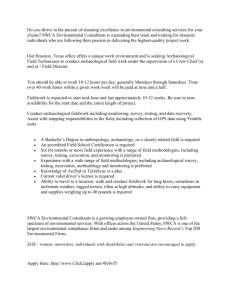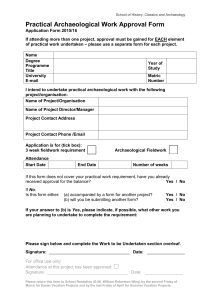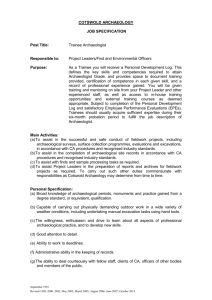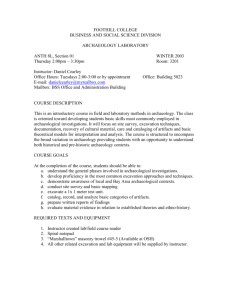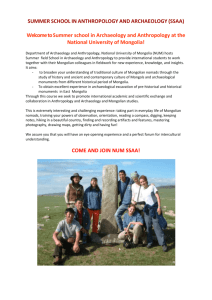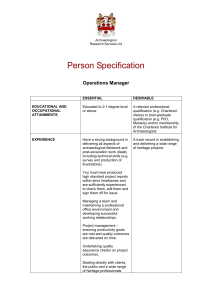University of Kent
advertisement
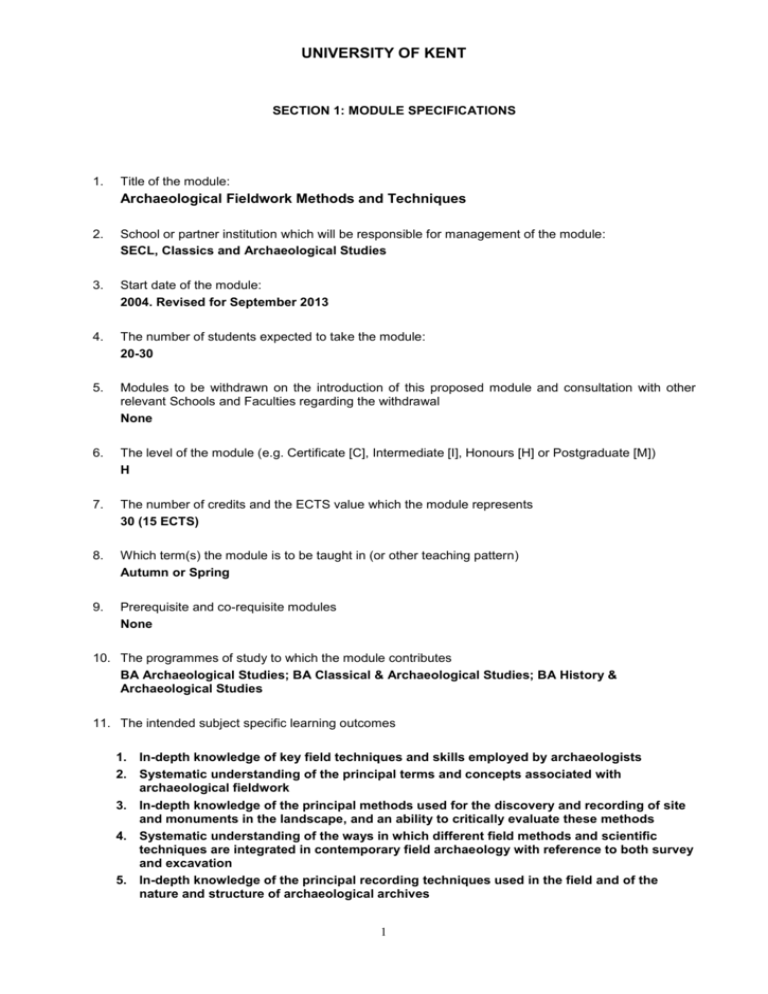
UNIVERSITY OF KENT SECTION 1: MODULE SPECIFICATIONS 1. Title of the module: Archaeological Fieldwork Methods and Techniques 2. School or partner institution which will be responsible for management of the module: SECL, Classics and Archaeological Studies 3. Start date of the module: 2004. Revised for September 2013 4. The number of students expected to take the module: 20-30 5. Modules to be withdrawn on the introduction of this proposed module and consultation with other relevant Schools and Faculties regarding the withdrawal None 6. The level of the module (e.g. Certificate [C], Intermediate [I], Honours [H] or Postgraduate [M]) H 7. The number of credits and the ECTS value which the module represents 30 (15 ECTS) 8. Which term(s) the module is to be taught in (or other teaching pattern) Autumn or Spring 9. Prerequisite and co-requisite modules None 10. The programmes of study to which the module contributes BA Archaeological Studies; BA Classical & Archaeological Studies; BA History & Archaeological Studies 11. The intended subject specific learning outcomes 1. In-depth knowledge of key field techniques and skills employed by archaeologists 2. Systematic understanding of the principal terms and concepts associated with archaeological fieldwork 3. In-depth knowledge of the principal methods used for the discovery and recording of site and monuments in the landscape, and an ability to critically evaluate these methods 4. Systematic understanding of the ways in which different field methods and scientific techniques are integrated in contemporary field archaeology with reference to both survey and excavation 5. In-depth knowledge of the principal recording techniques used in the field and of the nature and structure of archaeological archives 1 UNIVERSITY OF KENT 6. Detailed knowledge of how archaeological fieldwork in England is organised, and awareness of issues pertaining to student participation in archaeological fieldwork 7. Systematic understanding of planning guidance and legislation and a critical appreciation of how it affects the excavation and management of archaeological sites. 8. In-depth knowledge of post-excavation prodecures and ability to critically evaluate current and future trends in the archiving and dissemination of archaeological information. 12. The intended generic learning outcomes: 1. 2. 3. 4. 5. Communication to specialist and non-specialist audiences Personal initiative in planning and organisation Problems solving including critical evaluation and judgement Ability to make use of appropriate resources e.g. professional level web databases. Ability to apply methods, techniques and appropriate knowledge in the design and effective execution of a personal project 13. A synopsis of the curriculum: This module covers the battery of up-to-date fieldwork techniques deployed in the discovery, recording and excavation of archaeological sites using a combination of lectures, smallgroup work and practical assignments in the field. Topics include strategies for finding and recording sites, from the analysis of historical sources and aerial photographs, to geophysics, fieldwalking, and the survey of earthworks and standing buildings. The full range of excavation techniques is examined including approaches to the excavation of special deposits such as burials and cremations and sampling strategies for the recovery of artefacts and environmental remains. The module concludes with post-excavation analysis and strategies for publication and dissemination of archaeological reports covering both traditional and computer-based applications. 14. Indicative Reading List Barker, P., 1993. Techniques of Archaeological Excavation, 3rd edition, London, Batsford. Bowden, M. 1999. Unravelling the Landscape, Stroud, Tempus Clarke, A. 1991. Seeing Beneath the Soil: Prospecting Methods in Archaeology, London, Batsford. Drewett, P. 1999. Field Archaeology: An Introduction, London, University College London Gater, J. and Gaffney, C. 2003. Revealing the Buried Past: Geophysics for Archaeologists, Stroud, Tempus. Roskams, S. 2001. Excavation, Cambridge Manuals in Archaeology, Cambridge University Press. 15. Learning and Teaching Methods, including the nature and number of contact hours and the total study hours which will be expected of students, and how these relate to achievement of the intended learning outcomes The total number of contact hours for the module will be 60 hours; leaving 240 hours for private study. The former takes into account a briefing on how to complete the fieldwork portfolio and follow-up sessions designed to provide feedback on students’ progression through the assessment. It should be noted that a substantial part of the work for the portfolio will be completed during contact hours. Presentations enhanced by illustrative material: SSLO: I,2,3,5,6,7,8,9 GLO: 4,7,10 Seminar-based discussion and group-work: SSLO 1,2,3,4,5,6,7,9, GLO: 2,3,4,5,6,7,9 Fieldwork: SSLO 1,2,3,4, GLO: 2,3,4,6 2 UNIVERSITY OF KENT 16. Assessment methods and how these relate to testing achievement of the intended learning outcomes 100% Coursework: 1) Continual assessment: 5000-word portfolio based upon practical skills learnt during seminars and fieldwork (75%, divided into two submissions worth 30% and 45% respectively) (SSLOs 1, 2,3,4, 5, 6; GLOs 1,3, 4) 2) Continual assessment: one written archaeological report of 3000 words (25%; to be drawn from the following): a. A desktop survey of a site scheduled for development b. A Methods Statement for the full-scale excavation of a site which has previously been evaluated archaeologically c. A Research Design for an archaeological landscape project d. A post-excavation assessment detailing data analysis, archiving publication and display to the public e. A comparative critique of two site reports of excavation web-sites f. A comparative examination of the contrasting methodologies applied to the excavation of urban and rural sites (SSLOs 1-5, 7-8, GLOs 1-5) 17. Implications for learning resources, including staff, library, IT and space None 18. The School recognises and has embedded the expectations of current disability equality legislation, and supports students with a declared disability or special educational need in its teaching. Within this module we will make reasonable adjustments wherever necessary, including additional or substitute materials, teaching modes or assessment methods for students who have declared and discussed their learning support needs. Arrangements for students with declared disabilities will be made on an individual basis, in consultation with the University’s disability/dyslexia support service, and specialist support will be provided where needed. 19. Campus(es) where module will be delivered: Canterbury 3 UNIVERSITY OF KENT SECTION 2: MODULE IS PART OF A PROGRAMME OF STUDY IN A UNIVERSITY SCHOOL Statement by the School Director of Learning and Teaching/School Director of Graduate Studies (as appropriate): "I confirm I have been consulted on the above module proposal and have given advice on the correct procedures and required content of module proposals" ................................................................ .............................................. Director of Learning and Teaching/Director of Graduate Studies (delete as applicable) Date ………………………………………………… Print Name Statement by the Head of School: "I confirm that the School has approved the introduction of the module and, where the module is proposed by School staff, will be responsible for its resourcing" ................................................................. .............................................. Head of School Date ……………………………………………………. Print Name SECTION 3: MODULE IS PART OF A PROGRAMME IN A PARTNER COLLEGE OR VALIDATED INSTITUTION (Where the module is proposed by a Partner College/Validated Institution) Statement by the Nominated Officer of the College/Validated Institution (delete as applicable): "I confirm that the College/Validated Institution (delete as applicable) has approved the introduction of the module and will be responsible for its resourcing" ................................................................. .............................................. Nominated Responsible Officer of Partner College/Validated Institution Date …………………………………………………. Print Name ………………………………………………….. Post …………………………………………. Partner College/Validated Institution 4 UNIVERSITY OF KENT Module Specification Template Last updated October 2012 5
